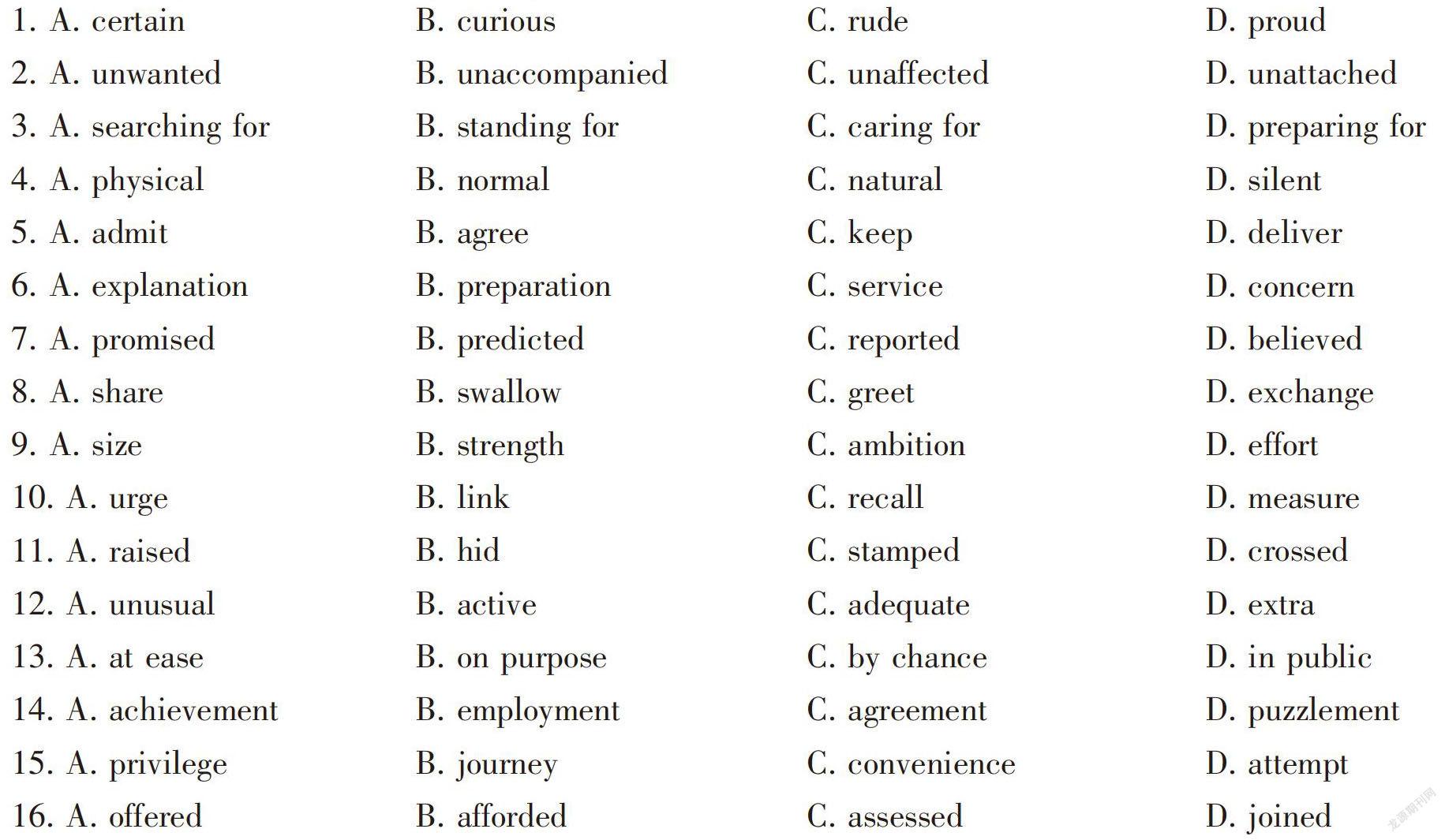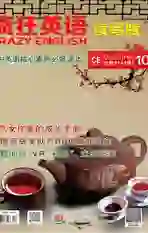周末加油站(Ⅹ)
2019-09-10本刊试题研究中心
本刊试题研究中心



Task 1
For many people, spending a few hours without your smartphone can feel like a lifetime. Now, one expert claims that humans are becoming so dependent on technology, that were actually merging(融入)into it.
Speaking at the Fast Company European Innovation Festival, Professor Yuval Noah Harari, a historian at the Hebrew University claimed that its becoming more and more difficult to tell where humans end and machines begin. He said, “It‘s increasingly hard to tell where I end and where the computer begins. In the future, it is likely that the smartphone will not be separated from you at all. It may be embedded in your body or brain, constantly scanning your biometric (生物特征的) data and your emotions.”
During his speech, Professor Harari highlighted how humans have affected our environment over time, and suggested that now may be the time to affect ourselves. He said, “Humanity has always remained constant. If we told our ancestors in the Stone Age about our lives today, they would think we are already Gods. But the truth is that even though we have developed more wonderful tools, we are the same animals. We have the same emotions, the same minds. The coming revolution will change that. It will change not just our tools, it will change the human being itself.”
If we do manage to merge with machines, Professor Harari suggests it could open the door to setting up civilisations beyond Earth. He added, “Life will be able to break out of planet Earth and no longer be confined (限定) to this flying rock.”
While Professor Hararis claims may sound farfetched(牽强的), he isn‘t alone in his vision of a machine-human world. Back in 2017, Elon Musk claimed that humans should merge with machines, or risk becoming “irrelevant”. He said, “Over time I think we will probably see a closer merger of biological intelligence and digital intelligence.”
1. Why does the author mention smartphone in paragraph 1?
A. To collect data for his text.
B. To have a good lead-in of the topic.
C. To show its harm to the environment.
D. To catch up with the development of science.
2. What do we know about Professor Harari?
A. His opinions gained much support.
B. He is the first expert to put forward the idea.
C. He thinks technology will change ourselves greatly.
D. His suggestion of us staying on the Earth is considerate.
3. What‘s Elon Musks attitude to Professor Hararis speech?
A. Neutral. B. Approving. C. Ambiguous. D. Indifferent.
4. What is the text mainly about?
A. Humans are near to combining with machines.
B. Call on people to develop advanced machines.
C. A speech caused peoples concerns about machines.
D. Finding new ways to break away from apps addiction is vital.
Task 2
Outer space is a dangerous environment, exposing astronauts to high levels of radiation.
1 But a new study has some good news: Space radiation doesnt seem to increase astronauts risk of death from cancer or heart disease, at least not at the doses they experienced during historical missions. Still, longer missions—such a mission to Mars—will likely come with much greater radiation doses that could pose larger health risks, the authors said.
Previous studies havent found a link between space travel and an increased risk of death from cancer or heart disease. 2 It includes 301 NASA astronauts who had traveled to space at least once since 1959, and 117 Russian or Soviet cosmonauts who had traveled to space at least once since 1961. These participants were followed for about 25 years, on average.
3 Among the 53 NASA astronauts who died, 30% died from cancer and 15% from heart disease; while among the 36 Russian or Soviet cosmonauts who died, 50% died from heart disease and 28% from cancer.
The researchers used a special statistical technique to determine whether deaths from cancer and heart disease likely had a common cause—in this case, the common cause would be space radiation. 4
“If radiation is impacting the risk of death due to cancer and heart disease, the effect is not dramatic,” the authors wrote in their study.
5 Future studies should continue to surveil(監控) astronauts “for potential harmful effects of exposure to space radiation”, they concluded.
A. NASA astronauts were on a spacewalk.
B. During this time, 89 of the participants died.
C. It leads to a different risk profile for future astronauts.
D. But their results did not point to a common cause of death.
E. The new study analyzed information from 418 space travelers.
F. Still, the study cannot determine whether longer missions would pose different risks.
G. Radiation exposure can increase cancer and heart disease rates in earthbound humans.
Task 3
As I stood at the crossroads, the male villagers all asked the same question: Was I
1 I wanted to climb the dangerous mountain?
Sure it had been climbed by local and foreign men, and local women, but a Western female, who arrived 2 .
I explained that I had been 3 some time in research and in 4 strength. I stressed that I would 5 their local traditions and hire some of their villagers as guides, but it seemed to do little to ease their 6 .
The male villagers told me of the quick mud I would encounter (遭遇). They 7 that it would grab hold of my legs and could 8 me whole, emphasizing this would certainly be my fate given my small 9 . While they couldnt
10 anyone this had actually happened to, they seemed convinced it was a real possibility.
The village women, on the other hand, smiled at me, and a few women 11 their arms. After witnessing the support and 12 voices of the local village women, the men agreed to an arrangement that seemed to put them 13 with my climb.
It seemed all parties were winners in the 14 . I could contribute a little to their village‘s income, while finally being allowed to begin my 15 with support and wishes from the local men and women alike.
As I made my way toward the mountain, I was 16 not only by my new mountain support 17 , but also by every village woman.
I knew I wasnt the first Western female to make the climb, and I certainly wouldnt be the last. But with the female villagers 18 accompanying me, I felt an overwhelming (巨大的) sense of collective 19 . The greatest risk is not taking a risk, and we should always
20 our dreams.
Task 4
一、語法填空
Thanks to the Chinese government scholarship, I was able to come to China and realize my dream as 1. __________ international student. In my two years of Masters study, I collected a bunch of wonderful memories.
One of them was joining a hiking marathon or climbing to the top of a mountain. I did not win the marathon, 2. __________ the sight of the beautiful landscapes along the way was enough for me. In China, I found that hiking is one of the best leisure 3. __________ (activity) of Chinese people.
The visit 4. __________Zijin Mountain last year was the most challenging yet very memorable to me because of the bad weather in winter and the long hours of journey 5. __________ (reach) the top. The temperature at that time reached to a freezing point. My hands were stone cold and my face 6. __________ (go) very pale already. When we reached the top, it was just so 7. __________ (attract). The sunset view was the best of all. One of my friends took a photo of 8. __________ (I) and my Chinese friend as if we were sharing the sun with our hands. We stayed on top for a while, until we felt that we should be leaving before we would 9. __________ (total) freeze to death.
I believe that 10. __________(climb) mountains gives someone a sense of direction and a motivation to reach your goal no matter how hard or unimaginable it could be.
二、书面表达
假定你是某国际学校学生李华,你的新西兰同学George 参加了本校专门为外国学生举办的中国诗文诵读大赛(Chinese Poetry Recitation Contest)并獲得一等奖,请你给他写封信,内容包括:
1. 表示祝贺;
2. 询问参选的作品;
3. 请他分享获奖感言。
注意:
1. 词数100左右;
2. 可以适当增加细节,以使行文连贯。
Dear George,
_______________________________________________________________
_______________________________________________________________
_______________________________________________________________
Yours,
Li Hua
